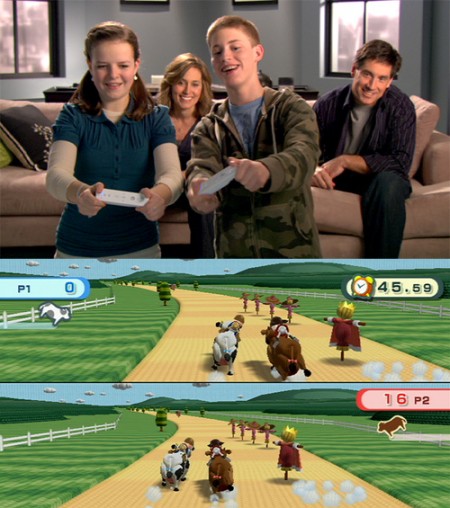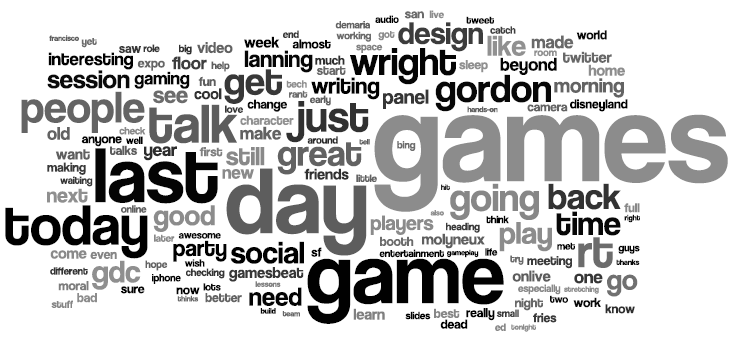Category: games
Toad’s Song
Something of a mashup: a song by the Mountain Goats framed as being sung by Toad.
(Via Peggy Wang via Free Williamsburg.)
On the Game Studies Download 4.0 at GDC
I’m a little late to blogging this, but here is the list of the top 10 Game Studies findings, presented at the Game Developers Conference by Ian Bogost, Mia Consalvo and Jane McGonigal.
The audience voted on the papers in order of importance, and my own Fear of Failing came in at #5.
The session slides are here.
****
10. Stewart Woods: “(Play) Ground rules: The social contract and the magic circle”.
9. Jose Zagal and Amy Bruckman: “Novices, gamers, and scholars: Exploring the challenges of teaching about games”.
8. Karen Collins: “Game sound: An introduction to the history, theory, and practice of video game music and sound design”.
7. Charlie Breindahl: “Play to win or win to play? The material culture of gaming”.
6. Gareth Schott: “Relating the pleasures of violent game texts”.
5. Jesper Juul: “Fear of failing: The many meanings of difficulty in video games”.
4. Matt Barton: “How’s the weather: Simulating weather in virtual environments”.
3. Betsy James DiSalvo, Kevin Crowley and Roy Norwood: “Learning in context: Digital games and young black men”.
2. Michael Nitsche: “Video game spaces: Image, play, and structure in 3D worlds”.
1. Susana Tosca & Lisbeth Klastrup: “Because it just looks cool!’ Fashion as character performance—the case of WoW”.
Wii Play: The Popular Bad Game?
Enthusiast site Ars Technica declares that “Wii Play becomes first bad game to sell 10 million“.
While Wii Play isn’t my favorite game, perhaps the Ars Technica headline and the 61% GameRanking average are both misleading? I do think it contains a good deal of enjoyable minigames suitable for a lazy afternoon.
In a Gamasutra article on Silver Gamers, Wii Play Cow Racing is even singled out as a popular minigame.
Is Wii Play a bad game? Or is it just a game for an audience other than game journalists?

(Image from Tiger Direct.)
New Issue of Eludamos
New issue out from Eludamos, the Journal for Computer Game Culture:
Vol 3, No 1 (2009)
Table of Contents
Positions
| Reproducing the machine | HTML PDF |
| Mia Consalvo | 1-3 |
Perspectives
| Serious games taken seriously | HTML PDF |
| Christian Swertz | 7-8 |
| Passionate Digital Play-Based Learning. (Re)Learning in computer games like Shadow of the Colossus | Abstract HTML PDF |
| Konstantin Mitgutsch | 9-22 |
| Key Dimensions of Contemporary Video Game Literacy: Towards A Normative Model of the Competent Digital Gamer | Abstract HTML PDF |
| Christoph Klimmt | 23-31 |
| Notes on the Biographical Meaning of Games and Online-Games | Abstract HTML PDF |
| Helle Meister, Gerrit Herlyn | 33-41 |
| Tanks, Chauffeurs and Backseat Drivers: Competence in MMORPGs | Abstract HTML PDF |
| Diane Carr, Martin Oliver | 43-53 |
Articles
| Games and Self-Imagining, a Comparative Media Perspective | Abstract HTML PDF |
| Jan Van Looy | 57-68 |
| ‘I am Trying to Believe’: Dystopia as Utopia in the Year Zero Alternate Reality Game | Abstract HTML PDF |
| Alexander Charles Oliver Hall | 69-82 |
Reviews
| I HEART LocoRoco – a reading of a gameplay experience | Abstract HTML PDF |
| Emma Westecott | 85-93 |
| The pleasurable lightness of being: Interface, mediation and meta-narrative in Lucasfilm’s Loom | Abstract HTML PDF |
| Jaroslav Švelch | 95-102 |
| Pure Hardcore? wipEout HD and current game design | Abstract HTML PDF |
| Fares Kayali | 103-106 |
| Assembling a Mosaic of the Future: The Post-Nuclear World of Fallout 3 | Abstract HTML PDF |
| Martin Pichlmair | 107-113 |
Game Developers Conference 2009, as told through Twitter
What were the main themes of the Game Developers Conference last week?
I participated in the Real-time Research session where my group (Ulrika Bennerstedt, Mia Consalvo, Jonas Linderoth, Meagan Rothschild, John Sharp + me) examined what participants were twittering about in the #gdc channel. I made a script to collect the twitter data, then we analyzed word frequencies using Wordle.
[Update: Download the pdf here.]
Brief analysis:
- During the summits on Monday and Tuesday, the iPhone was the most commonly discussed platform.
- Wednesday and Thursday were dominated by the Satoru Iwata and Hideo Kojima keynotes.
- Friday was dominated by the all-star panel on the Role of Games in Personal and Social Change.
- Apart from that, it was a somewhat theme-less conference, with casual, indie and social games taking up still larger parts of the conversation, and some element of a wait-and-see attitude. Are video games recession-proof?
Monday:
Tuesday:
Wednesday:
Thursday:
Friday:
Beyond Balancing: My GDC 2009 slides
Just finished my Game Developers 2009 conference talk, Beyond Balancing: Using Five Elements of Failure Design to Enhance Player Experiences.
Good questions afterward, so it seemed to go well. The slides can be downloaded here.
Off to (and Speaking at) the Game Developers Conference
I am heading off to the Game Developers Conference once again.
I am giving a talk on the meaning of failure in games: Beyond Balancing: Using Five Elements of Failure Design to Enhance Player Experiences.
If you have been following this blog, you may have noticed that I have been interested in the role of failure lately. This being GDC, the talk is pretty practically oriented, presenting data and concepts, then demonstrating their applicability:
Beyond Balancing: Using Five Elements of Failure Design to Enhance Player Experiences
Speaker: Jesper Juul (Lecturer / Researcher, Singapore-MIT GAMBIT Game Lab)
Date/Time: Friday (March 27, 2009) 10:30am — 10:50am
Location (room): Room 2022, West Hall
Track: Game Design
Secondary Track: Production
Format: 20-minute Lecture
Experience Level: All
Session Description
This lecture presents a toolbox for improving failure design in single player games. Player research shows that the primary issue is not the frequency of failures, but how failure is communicated, what happens as a result of failing, and whether a given failure design allows the game to be enjoyed within a player’s time constraints. Using concrete examples, this lecture will show how failure can play a positive role in games, how players of casual games are actually not averse to failure, and how developers can get beyond balancing to improve the failure design in their games.
Takeaway
Attendees will be introduced to new research on how players perceive failure in games. A framework of Five Elements of Failure design will be presented. Attendees will be able to use the framework for improving the design, testing, and balancing of video games for different audiences.
Intended Audience and Prerequisites
Designers, producers, testers, and marketers interested in both rethinking the role of difficulty and failure in their games and in tailoring game design to the preferences and time constraints of their audience. Knowledge of game balancing issues is helpful but not required.





